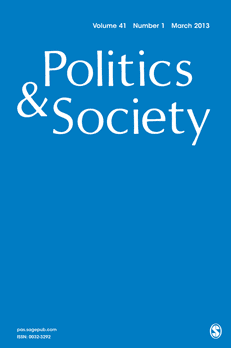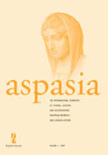
OSTEUROPA
metrics 2024
Bridging Disciplines in Eastern European Research
Introduction
OSTEUROPA is a distinguished academic journal dedicated to the examination and analysis of social, cultural, and political developments in Eastern Europe. Published by BWV-BERLINER WISSENSCHAFTS-VERLAG GMBH, this journal has been a critical voice in the field since its inception in the mid-20th century, notably converging from various years to establish a comprehensive discourse on the dynamics shaping the region. With an ISSN of 0030-6428 and an E-ISSN of 2509-3444, OSTEUROPA taps into the expansive fields of sociology and political science, holding a reputable Q3 category ranking in these disciplines for 2023. While not currently an open access publication, it remains a vital platform for researchers, professionals, and students alike who seek to deepen their understanding of Eastern European affairs. The journal also ranks in the 17th percentile within the Scopus listings, underscoring its role as a significant, albeit niche, contributor to social studies and political science scholarship. Addressed from its base in vibrant Berlin, OSTEUROPA continues to foster intellectual dialogue and provide valuable insights into the complexities of Eastern European societies.
Metrics 2024
 0.20
0.20 0.30
0.30 0.20
0.20 11
11Metrics History
Rank 2024
Scopus
IF (Web Of Science)
JCI (Web Of Science)
Quartile History
Similar Journals

Istorija
Illuminating History, One Article at a TimeIstorija is a distinguished academic journal published by Vytautas Magnus University Education Academy, focusing on historical research and discourse. With its ISSN 1392-0456 and E-ISSN 2029-7181, the journal aims to disseminate high-quality scholarly articles that explore various facets of history, catering to an audience of researchers, educators, and students alike. Although currently not open access, Istorija remains committed to advancing historical scholarship by contributing valuable insights and fostering academic dialogue through an inclusive editorial process. Set against the backdrop of Vilnius, Lithuania, the journal engages with both regional and international historical narratives, making it a pivotal resource for those looking to deepen their understanding of historical events, methodologies, and interpretations. Whether you are a seasoned historian or a burgeoning scholar, Istorija offers a platform for the exploration and exchange of innovative ideas and research within the discipline.

Eastern Journal of European Studies
Connecting scholars and practitioners in the heart of Europe.Eastern Journal of European Studies is a distinguished open-access platform published by UNIV ALEXANDRU IOAN CUZA, CENTRUL STUDII EUROPENE, dedicated to advancing research and scholarship in the fields of Economics, History, Political Science, and Sociology. Since its inception in 2010, this journal has been committed to fostering a rich dialogue among scholars and practitioners, emphasizing interdisciplinary approaches to European studies. With a notable Q1 ranking in History and Q3 rankings in other social sciences categories as of 2023, the journal holds a strong position in both European and global research landscapes. As part of the Scopus indexing, it stands out with impressive percentiles, including the 90th percentile in History. By providing an open-access platform, the journal ensures that critical research is widely accessible, bridging gaps between academia and the public. It serves as an essential resource for researchers, policymakers, and students interested in exploring Europe’s complex dynamics, making significant contributions to contemporary debates and policy implications.

New Perspectives
Fostering fresh insights in contemporary political challenges.New Perspectives is a pivotal academic journal published by SAGE Publications Inc, dedicated to advancing the fields of Political Science and International Relations. With a focus on innovative research and critical analysis, it has established a notable presence since its inception in 2015, currently holding a Q3 ranking in its category for 2023. Based in the Czech Republic, New Perspectives has a robust Scopus rank of #292 out of 706, placing it in the 58th percentile among social science journals. This underscores its significance in fostering scholarly dialogue and presenting fresh ideas in a rapidly evolving global landscape. While not open access, the journal attracts a diverse readership, including researchers, professionals, and students who are keen on exploring emerging trends and insights in political theory and international discourse. The journal’s commitment to high-quality scholarship makes it an essential resource for those aiming to contribute to and engage with contemporary political challenges.

PACIFIC AFFAIRS
Navigating the Complexities of Pacific Affairs and BeyondPACIFIC AFFAIRS is a distinguished journal published by the University of British Columbia, specializing in the fields of Sociology, Political Science, and Geography. With a history dating back to its converged years starting in 1979, this journal has established itself as a crucial platform for scholarly discourse on societal and geopolitical issues within the Pacific region and beyond. Although it is not an open-access journal, it provides valuable insights and research findings that contribute rigorously to its respective fields, holding a respectable Q3 ranking in Geography, Planning and Development and a Q2 ranking in Sociology and Political Science as of 2023. Currently, it holds a Scopus rank of 620 out of 1466 in Sociology and Political Science, reflecting its significance in academic research. PACIFIC AFFAIRS continues to inspire researchers, professionals, and students alike to engage with pressing topics relevant to the Pacific area, providing a platform for innovative research and critical analysis.

POLITICS & SOCIETY
Exploring the intricate dynamics of political and social landscapes.POLITICS & SOCIETY is a premier journal published by SAGE Publications Inc, dedicated to advancing scholarly discourse in the fields of political science, sociology, and international relations. Established in the early 1970s, it has garnered a strong reputation, reflected in its esteemed Q1 rankings across multiple categories, including Political Science and International Relations, as well as Sociology. With a significant emphasis on interdisciplinary approaches, the journal publishes innovative research that explores the complex interplay of politics and societal dynamics globally. Researchers aiming to publish high-quality articles will appreciate the journal's rigorous peer-review process and its commitment to theoretical and empirical excellence. Although not an open-access journal, it ensures wide accessibility through various institutional subscriptions. As the landscape of political and social studies evolves, POLITICS & SOCIETY remains at the forefront, making vital contributions to our understanding of the pressing issues that shape contemporary society.

Pamiec i Sprawiedliwosc
Connecting Past and Present through Scholarly InquiryPamiec i Sprawiedliwosc is a pivotal academic journal published by the Instytut Pamięci Narodowej, Biuro Edukacji Publicznej, focused on the fields of history, memory studies, and social justice. This journal, identifiable by its ISSN 1427-7476, aims to facilitate the exploration and discourse on the interplay between memory and justice in the context of Polish history and beyond. With an emphasis on fostering scholarly dialogue, it serves as an essential platform for researchers, professionals, and students interested in understanding the historical narratives and collective memories that shape societal values. Although it is currently not an open-access journal, it commits to disseminating valuable research findings and theoretical discussions that resonate with contemporary issues within the domain of memory and justice. As a contributing voice in this field, Pamiec i Sprawiedliwosc not only preserves historical insight but also inspires ongoing educational debates crucial for a reflective society.

Revista UNISCI
Fostering Innovation in Political Science and International RelationsRevista UNISCI is a distinguished open-access journal published by UNIV COMPLUTENSE MADRID, SERVICIO PUBLICACIONES, dedicated to advancing the discourse in the fields of Political Science and International Relations. Since its inception in 2005, it has established a platform for emerging scholars and seasoned researchers alike to share innovative ideas and findings. With an E-ISSN of 2386-9453, Revista UNISCI is accessible to a global audience, facilitating knowledge dissemination in an increasingly interconnected world. The journal has been categorized in Q4 quartile for 2023, highlighting its relevance in the competitive landscape of academic publishing, while its Scopus rank of 566 out of 706 positions it among the prominent voices in the discipline. As the journal enters its converged years from 2015 to 2024, it aims to foster interdisciplinary dialogue and contribute to ongoing research debates, ultimately enriching the academic community’s understanding of critical global issues.

Codrul Cosminului
Illuminating the Past to Understand Our PresentCodrul Cosminului, published by Stefan cel Mare University in Romania, is an esteemed open-access journal that has been facilitating scholarly discourse since 2004. With an ISSN of 1224-032X and an E-ISSN of 2067-5860, it plays a crucial role in the fields of Cultural Studies, History, Political Science, International Relations, and Religious Studies. The journal’s impact is evidenced by its 2023 categorization in Q2 for multiple disciplines, marking it as a reputable platform for researchers. This interdisciplinary journal serves as a vital resource for academics and practitioners alike, encouraging contributions that explore diverse cultural and historical narratives. The Scopus rankings further illustrate its relevance, positioning it within influential tiers across its fields. Researchers and students will find Codrul Cosminului invaluable for accessing high-quality, peer-reviewed content that enhances their understanding of complex societal and cultural dynamics.

Aspasia
Unveiling diverse perspectives on gender and history.Aspasia is a distinguished open-access journal dedicated to the fields of Gender Studies and History, published by BERGHAHN JOURNALS and based in the United Kingdom. Since its inaugural issue in 2011 and achieving open access in 2019, Aspasia has committed to providing a platform that explores diverse scholarly perspectives on women's experiences and gender dynamics within historical contexts. With an impact factor reflective of its rigorous peer-review process, Aspasia has achieved notable rankings, including Q4 in Gender Studies and Q3 in History for 2023, indicating its growing influence within these disciplines. The journal is indexed in prominent databases, showcasing its relevance and contribution to ongoing academic discourse. Researchers, professionals, and students are encouraged to explore its rich content, fostering critical dialogue and advancing knowledge in the understanding of gender and historical narratives.

Lithuanian Historical Studies
Decoding the Cultural and Historical Fabric of LithuaniaLithuanian Historical Studies is a respected academic journal published by BRILL, focusing on the nuanced exploration of cultural, historical, and sociopolitical dynamics within Lithuania and its historical context. With an ISSN of 1392-2343 and an E-ISSN of 2538-6565, this journal aims to disseminate scholarly research that contributes to the understanding of Lithuania's cultural heritage and historical developments. Although it operates without an open-access model, its content is essential for researchers, professionals, and students interested in History, Cultural Studies, and Religious Studies. Ranked in the fourth quartile across several categories in 2023, including Cultural Studies and Sociology and Political Science, it provides a platform for academic discourse among those researching in the field. Despite its modest Scopus rankings, it plays a critical role in advancing knowledge within these disciplines and fostering dialogue across them, making it a valuable resource for anyone engaged in the study of Lithuanian or broader Eastern European history.